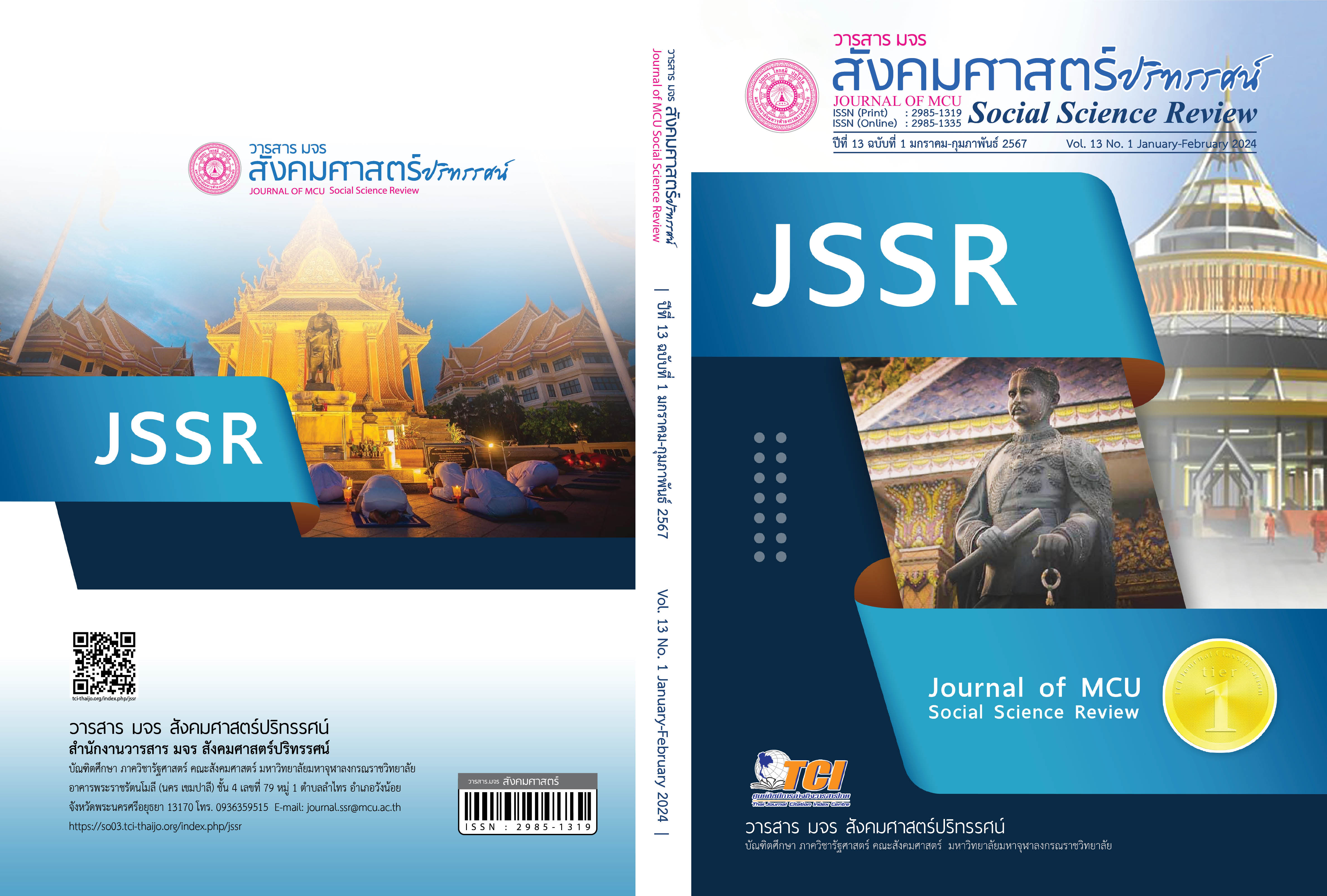ความเชื่อมั่นและการยอมรับของประชาชนในสังคม ต่อผู้เคยติดเชื้อไวรัสโคโรนา 2019
คำสำคัญ:
ไวรัสโคโรนา 2019, ความเชื่อมั่น, การยอมรับ, ผู้เคยติดเชื้อไวรัสโคโรนา 2019บทคัดย่อ
บทความวิจัยนี้มีวัตถุประสงค์ 1. หาความเชื่อมั่นและการยอมรับของประชาชนในสังคมต่อผู้เคยติดเชื้อไวรัสโคโรนา 2019 และ 2. แนวทางการปฏิบัติตนของประชาชนที่ถูกต้องต่อโรคติดเชื้อไวรัสโคโรนา 2019 กลุ่มตัวอย่าง คือ ประชาชนที่อาศัยในจังหวัดเชียงราย จำนวน 18 อำเภอ อำเภอละ 20 คน จำนวน 360 คน และได้รับแบบสอบถามกลับคืน จำนวน 320 ชุด คิดเป็นร้อยละ 88.88 เครื่องมือที่ใช้ในการวิจัย คือ แบบสอบถาม สถิติที่ใช้ในการวิจัย คือ ค่าความถี่ ร้อยละ ค่าเฉลี่ย และส่วนเบี่ยงเบนมาตรฐาน
ผลการศึกษา พบว่า 1. ประชาชนส่วนใหญ่มีความเชื่อมั่นและการยอมรับที่มีต่อผู้เคยติดเชื้อไวรัสโคโรนา 2019 ภาพรวมอยู่ในระดับมากทั้ง 3 ด้าน คือ ด้านการยอมรับและการอยู่ร่วมกันในสังคมของประชาชน ด้านนโยบายของรัฐต่อการสร้างความเชื่อมั่นของ และ ด้านจิตสำนึกร่วมและความรับผิดชอบต่อสังคมของประชาชน 2. ข้อเสนอแนะแนวทางเกี่ยวกับการดูแลสุขอนามัยส่วนบุคคลและปฏิบัติตามมาตรการของกระทรวงสาธารณสุข เช่น 1) ออกจากบ้านเมื่อจำเป็น เว้นระยะห่างจากคนอื่นอย่างน้อย 1-2 เมตร หลีกเลี่ยงการเข้าไปในพื้นที่ที่มีคนหนาแน่น 2) สวมหน้ากากอนามัยตลอดเวลา 3) ล้างมือด้วยสบู่หรือเจลแอลกอฮอล์ทุกครั้ง และ 4) รับประทานอาหารแยกสำรับหรือหากทานอาหารร่วมกันให้ใช้ช้อนกลางส่วนตัว
เอกสารอ้างอิง
กรมส่งเสริมการปกครองส่วนท้องถิ่น. (2563). รายงานสถิติทางทะเบียนประชากร สำนักบริหารการทะเบียนกรมการปกครอง กระทรวงมหาดไทย. สืบค้น 9 กรกฎาคม 2563, จาก www.stat.bora.dopa.go.th/stat/pk/pk_63
กำธร มาลาธรรม และพรทิพย์ มาลาธรรม. (2563). ศึกษาสิ่งที่ได้เรียนรู้จากประสบการณ์ของประเทศไทยกรณีการระบาดของโควิด-19. นนทบุรี: กรมควบคุมโรค กระทรวงสาธารณสุข.
กิตติพร เนาว์สุวรรณ และคณะ. (2563). ความสัมพันธ์ระหว่างการรับรู้ความรุนแรงของโรคต่อบทบาทการดำเนินงานควบคุมโรคติดเชื้อไวรัสโคโรนา. วารสารสถาบันบำราศนราดูร, 14(2), 92-103.
ธีรโชติ เกิดแก้ว. (2563). มิติแห่งการแบ่งปัน : ภาพสะท้อนชีวิตและสังคมจากโรงทานสมัยพุทธกาลสู่ตู้ปันสุขยุคโควิด 19. วารสาร มจร สังคมศาสตร์ปริทรรศน์, 9(4), 322-336.
บุญเลี้ยง ทุมทอง และฐิตวันต์ หงส์กิตติยานนท์. (2565). ผลกระทบจากสถานการณ์โควิดที่มีต่อการจัดการศึกษาไทย. วารสาร มจร สังคมศาสตร์ปริทรรศน์, 11(3), 436-455.
พระเอกลักษณ์ อชิโต และคณะ. (2563). บทบาทพระสงฆ์กับงานสาธารณสงเคราะห์ภายใต้สถานการณ์การแพร่ระบาดของไวรัส Covid19 : กรณีศึกษาบทบาทของหลวงพ่อแดง นนฺทิโย วัดอินทาราม จังหวัดสมุทรสงคราม. วารสาร มจร สังคมศาสตร์ ปริทรรศน์, 9(3), 289-304.
ศูนย์ติดตามสถานการณ์ COVID 19 เชียงราย. (2563). รายงานสถานการณ์โควิดของประเทศและจังหวัดเชียงราย. สืบค้น 17 กรกฎาคม 2563, จาก www.chiangrai.go.th
ศูนย์ปฏิบัติการด้านข่าวโรคติดเชื้อไวรัสโคโรนา 2019. (2563.) รายงานข่าวกรณีติดเชื้อไวรัสโคโรนา 2019. สืบค้น 13 มีนาคม 2563, จาก www.news.thaipbs.or.th/289799
ศูนย์ปฏิบัติการภาวะฉุกเฉิน กรมควบคุมโรค. (2563). ข้อมูลสำหรับการป้องกันตนเองจากโรค COVID-19. นนทบุรี: ศูนย์ปฏิบัติการภาวะฉุกเฉิน กรมควบคุมโรค.
เสาวณี จันทะพงษ์ และคณะ. (2563). วิกฤตโควิด 19 กับมุมมองด้านเศรษฐศาสตร์สุขภาพ.สืบค้น 7 กรกฎาคม 2563, จาก www.bangkokbiznews.com/blog/650606
ดาวน์โหลด
เผยแพร่แล้ว
รูปแบบการอ้างอิง
ฉบับ
ประเภทบทความ
สัญญาอนุญาต
ลิขสิทธิ์ (c) 2024 วารสาร มจร สังคมศาสตร์ปริทรรศน์

อนุญาตภายใต้เงื่อนไข Creative Commons Attribution-NonCommercial-NoDerivatives 4.0 International License.
เพื่อให้เป็นไปตามกฎหมายลิขสิทธิ์ ผู้นิพนธ์ทุกท่านต้องลงลายมือชื่อในแบบฟอร์มใบมอบลิขสิทธิ์บทความให้แก่วารสารฯ พร้อมกับบทความต้นฉบับที่ได้แก้ไขครั้งสุดท้าย นอกจากนี้ ผู้นิพนธ์ทุกท่านต้องยืนยันว่าบทความต้นฉบับที่ส่งมาตีพิมพ์นั้น ได้ส่งมาตีพิมพ์เฉพาะในวารสาร มจร สังคมศาสตร์ปริทรรศน์ เพียงแห่งเดียวเท่านั้น หากมีการใช้ภาพหรือตารางหรือเนื้อหาอื่นๆ ของผู้นิพนธ์อื่นที่ปรากฏในสิ่งตีพิมพ์อื่นมาแล้ว ผู้นิพนธ์ต้องขออนุญาตเจ้าของลิขสิทธิ์ก่อน พร้อมทั้งแสดงหนังสือที่ได้รับการยินยอมต่อบรรณาธิการ ก่อนที่บทความจะได้รับการตีพิมพ์ หากไม่เป็นไปตามข้อกำหนดเบื้องต้น ทางวารสารจะถอดบทความของท่านออกโดยไม่มีข้อยกเว้นใดๆ ทั้งสิ้น





